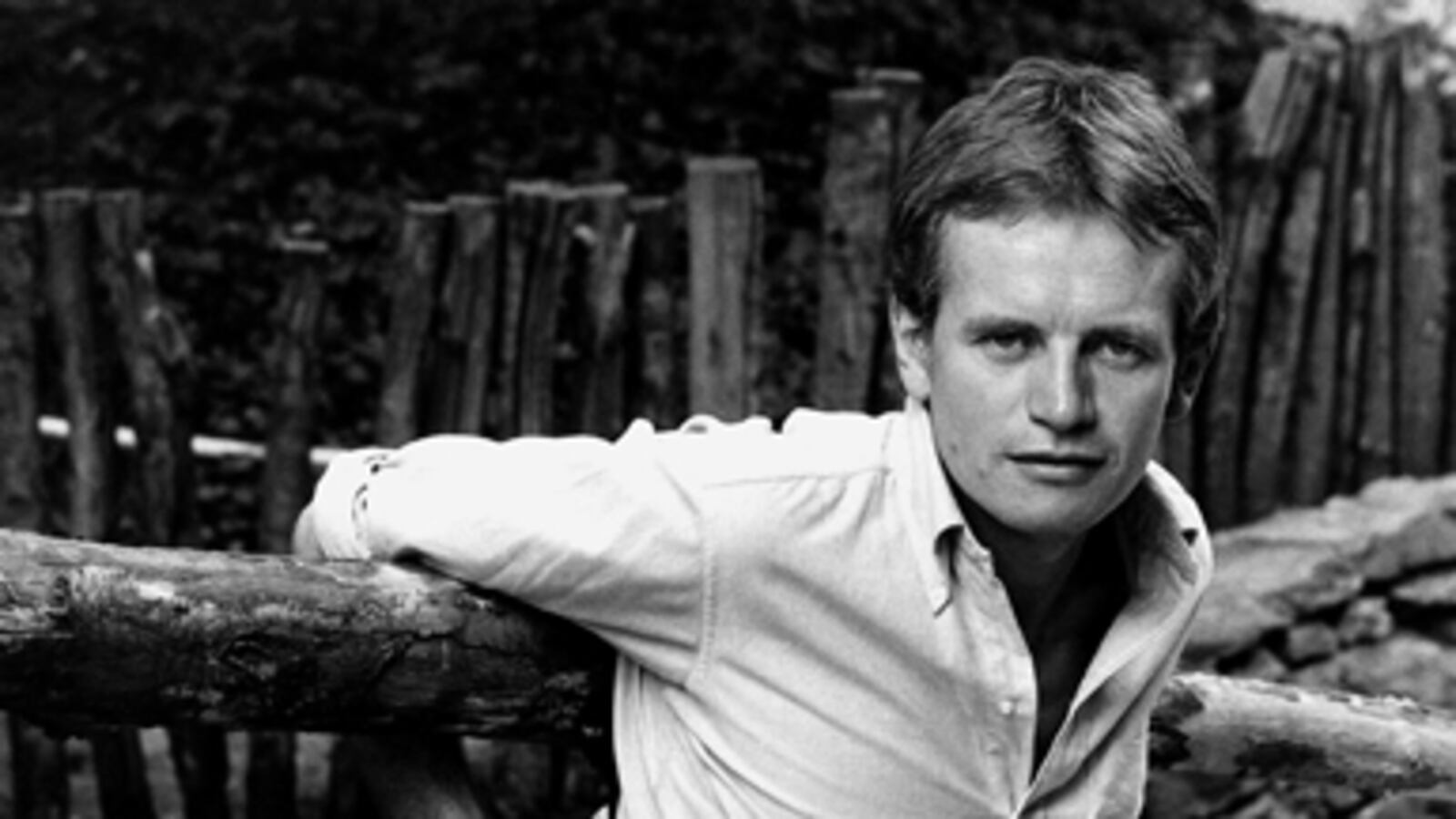Even as a young boy, the English novelist and travel writer Bruce Chatwin yearned to be anywhere but wherever he happened to be—and someone other than himself. In middle age, he recalled being no more than four years old when he observed "gypsy caravans moving up a lane and then a gypsy boy, very brown, on a piebald pony stripped to the waist riding by and being envious in some way or another." And the envy only intensified with time: "In one of the five schools he attended before he was eight, he told pupils he was an orphan," says Chatwin's biographer, Nicholas Shakespeare.
Chatwin was, of course, a dazzling embellisher—detractors still call him a serial liar—but it is hard to discredit his recollections of a childhood spent chafing against middle-class Englishness. Birmingham, after all, seems an unlikely breeding ground for so rarefied a creature as the author of In Patagonia. No doubt Chatwin's elevated sense of otherworldliness originated partly in embarrassment over his undistinguished background. But it followed, too, from the aura that others created around him, years before his death from AIDS-related complications in 1989, at the age of forty-eight. Chatwin's books—he published a precious six in his brief career—no longer enjoy the cultish following that they once did. But Chatwin himself remains in certain literary circles an enduring object of fascination and, often as not, resentment and derision.

In certain respects, Chatwin didn't have to work at casting a spell or raising eyebrows. His extreme nomadism had an air of almost absurd implausibility from the first. With his delicate features and flaxen hair, he looked genetically incapable of venturing far from London, never mind channeling Magellan in the wilds of South America. The same might be said of another delicately handsome itinerant, T. E. Lawrence. Chatwin bristled at comparisons between himself and Lawrence, even as he conceded his fascination with the man. Anyone setting out to explain Chatwin—to account for his genius and lay bare the ultimate source of his wanderlust—must invariably resort to analogy. "Two hundred years ago, Bruce might have conquered a large slice of Empire and he probably would have died early and been buried in Afghanistan," said Stephen Spender. "He didn't like England, but that is very English too. The British Empire, after all, was based on people trying to get away from Britain."
Whatever kinship Chatwin felt with imperial wanderers of yore, it has been easier on the whole to cast him in a familiar mold than to embrace the ineffable elusiveness of his temperament. Just who, exactly, did Bruce Chatwin think he was? Of all Chatwin's alleged sins—snobbery, narcissism, coldness, self-deception—refusing to be known may have been his least forgivable. Now, thanks to a marvelous new collection of letters edited by his widow Elizabeth and Nicholas Shakespeare, readers can judge for themselves the depth of Chatwin's enigma.
Of all Chatwin's alleged sins—snobbery, narcissism, coldness, self-deception—refusing to be known may have been his least forgivable.
Under the Sun gathers together some four decades of correspondence, written between the tail end of Chatwin's seventh year and the dawn of his forty-eighth. Shakespeare likens the volume to an accidental autobiography—"messy, repetitive, congested, of the moment." It is equally—and delightfully—a vibrant testament to Chatwin's gift for friendship. Chatwin has been remembered as an exhausting companion, an incessant talker whose enthusiasm for odd people and places was matched only by his spectacular self-absorption. He seldom stayed put long enough to establish friendships of any real depth; he lacked the constitution to maintain those he did have. Or so the mantra goes. It is plain to see why Chatwin irritated, and often cruelly hurt, those who loved him. His adult life seems, in retrospect, to have been a one ingenious disappearing act. Yet for all of the emotional distance that he placed between himself and others—notably his long-suffering wife of almost twenty-five years—Chatwin was a loyal and indefatigable correspondent to the end. At least in his own inconsistent way. With his adoring parents in particular, Chatwin was a particularly generous correspondent, and his letters to them rank among the most amusing and revealing collected here.

Chatwin's tone throughout Under the Sun recalls the Duchess of Devonshire's epistolary adieu, "In tearing haste—." But rushed as his post cards, notes, and letters are, they nonetheless satisfy as Chatwin's books—with their chiseled, austere prose—cannot. The mad success of Chatwin's first book, In Patagonia (1977), won him a legion of admirers, the most accomplished of whom he courted and cultivated in vibrant letters dispatched from this or that far-flung corner of the earth. Graham Greene, Susan Sontag, and Nöel Coward all appear in these pages, as does the young Salman Rushdie. What immense pleasure Chatwin's jaunty post cards and notes must have given their recipients, who, stuck in London or New York, surely relished being swept up in the rush of Chatwin's life as he bounced from Florence to Kenya's Lamu Island. On paper, as in the flesh, Chatwin proved as irrepressible as he was irresistible. And cruelly hilarious, in the best possible sense.
To Elizabeth Chatwin Hotel Lancaster | Buenos Aires | Argentina | [December 1974]
Dearest E, Buenos Aires is utterly bizarre a combination of Paris and Madrid shorn of historical depth, with hallucinating avenidas flanked with lime trees, where not even the humblest housewife need forego the architectural aspirations of Marie Antoinette. I have been mixing with Anglo-Argentines who have lost command of English and all knowledge of home and with some of the crustier Argentines who speak it far better than I do. Wonderful houses like Meridian House but still thriving with boiseries, Louis XV and paté en croute. There is always the vague feeling that the high-flown French or English conversation may be interrupted by guerrillas, but no-one seems unphased by it.
Chatwin emerges, in Under the Sun, as a man utterly captivated by people, except, that is, when he is running from them. The greatest mystery remains, as ever, Chatwin's love life—his "prodigious bisexuality," as William Dalrymple has put it. Chatwin took numerous male lovers through the years, the film director James Ivory among them; a handful of these men have commented on their relationships with Chatwin. For the most part, though, the matter of his sexuality was always the thousand-pound gorilla in the room: talked about behind his back, and a source of immense frustration to friends who expected a degree of honesty from Chatwin than he was able to muster. "I don't believe in coming clean," he once said. Without intending to, though, Chatwin sometimes did reveal more than he meant to about his affaires d'amour. And then, as in this 1972 letter to James Ivory, he is touchingly vulnerable and guileless.
To James Ivory P.O. Box 464 | Harriman Route | Klamath Falls | Oregon | 14 September 1972
Dear Jim, All well here. Fine but cold. This is the last letter. Hope it's not a declaration of total war from your sister. Cary [Welch] writes me that he hasn't yet gone to England and will do so before the end of the month and will then be in the flat. You'll have to arrange it between you who has it, and there's not room for two, UNLESS OF COURSE . . . But that is impossible. Off to Ashland to shop. love B
Chatwin was never so vulnerable as he was in the years leading up to the end. Did he know? Or was he deceiving himself—and others—about the nature of his terrible sickness?
To Gertrude Chanler Homer End | Ipsden | Oxford | 'but still in hospital' | [13 October 1986]
My dear Gertrude, So very many thanks for your sweet letter: this is the first one I have written since "the collapse." Trust me to pick up a disease never recorded among Europeans. The fungus that has attacked my bone marrow has been recorded among 10 Chinese peasants (China is presumably where I got it), a few Thais and a killer-whale cast up on the shores of Arabia. The great test comes when we find out whether I can go on producing red blood cells on my own.
Perhaps if Chatwin hadn't died as he did, his harshest critics might have taken a gentler view of him as well as his output. "Nowhere," Shakespeare writes in his introduction to this collection, "does Chatwin arouse more suspicion than in the manner he is perceived to have dealt with his final illness: he died of AIDS, but denied in public the he had it. His denial bred a sense that if he lied about his life, he must have lied about his work." It's an ungenerous view, and one that Under the Sun goes a long way to undermine. Elizabeth Chatwin and Nicholas Shakespeare have given us Chatwin as no one has before, at his unadulterated finest.
Plus: Check out Book Beast for more news on hot titles and authors and excerpts from the latest books.
Kirk Davis Swinehart, a professor of history at Wesleyan University, has written for the Chicago Tribune, the New Republic, and the Washington Post. He is at work on a book about a British family undone by the American Revolution.






